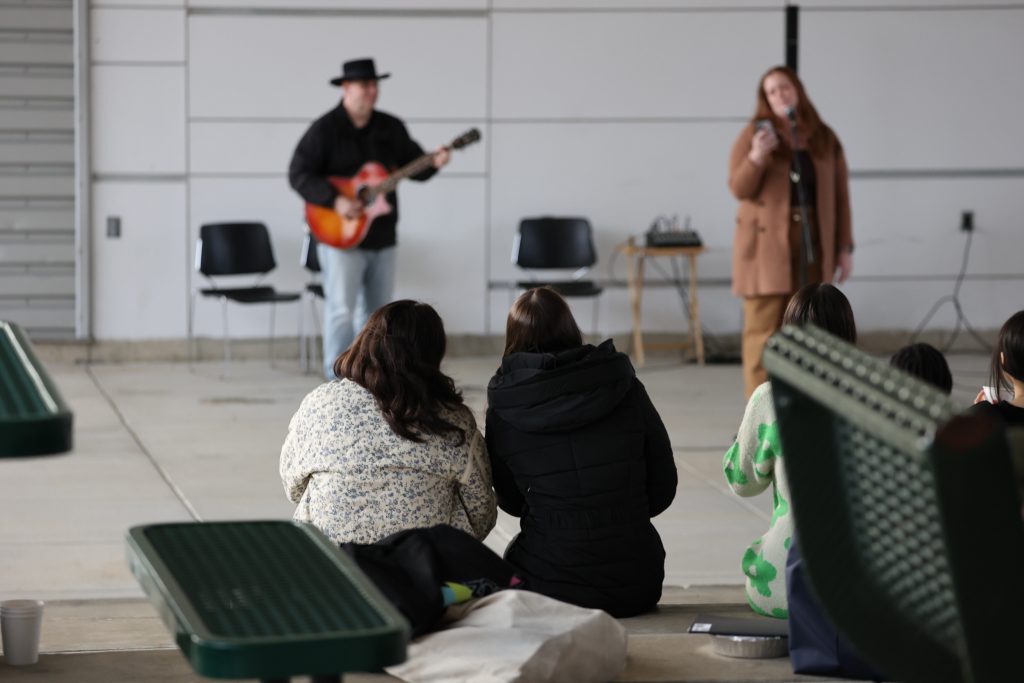A “Day of Caring” was held at the Appalachian Collegiate Center Amphitheater Friday afternoon in remembrance of Natalia Malcevic and others lost to tragic circumstances.
Largely planned and executed by Sydney Ferreira, the Student Association’s (SA) vice president for programming and a senior majoring in anthropology, and the SA’s Programming Board (SAPB), the event offered the campus community an opportunity to write both heartfelt messages to Malcevic’s family and general messages in support of mental health. Ferreira credited collaboration with the rest of the SA, Brian Rose — the University’s vice president for student affairs — and his assistants, the Consultation, Advocacy, Referral and Education (CARE) Team and the Dean of Students office for the event’s success.
The Office of Residential Life, Binghamton University’s Interfaith Council, the CARE Team, the Healthy Campus Initiative, the Student Psychological Association, the University Counseling Center (UCC), Active Minds, Health Promotion and Prevention Services (HPPS), Support Empathy Empowerment Kindness (SEEK) and the Employee Assistance Program were among the organizations tabling at the event.
Ferreira described her motivations for spearheading the event.
“Being that this semester has been difficult for a myriad of reasons, I thought a free event with food, musical performances, a bonfire, art stations and mental health resources tabling would be comforting,” Ferreira wrote in an email. “This event was proof that collaboration between students and faculty [and] staff can result in beautiful outcomes and that there are so many wonderful people on this campus working hard to advocate for and improve mental health resources on campus for everyone.”
In response to the tragedy, the Thurgood Marshall Pre-Law Society organized a candlelit vigil that night, and students left candles, flowers and messages at memorials on the Peace Quad and the Pegasus Statue.
Elisheva Ezor, the SA president and a senior double-majoring in mathematics and business administration, said the event’s focus on community building and its emphasis on the connection between different groups helped to expand its positive impact.
“I was really impressed and moved to see all of the collaboration,” Ezor said. “I think also creating spaces that are solely there for the promotion and creation of a safe place for mental health is really important. Personally, just being at the event and knowing the event was solely there to promote mental health was really beautiful and a lot of students, I think, appreciated that, and that’s why I think it’s important to our community because mental health reform and advocacy shouldn’t be an afterthought.”
Mark Rice, the UCC’s clinical director, emphasized the importance of accessible mental health resources.
“It’s so incredibly important that students have mental health support — in multiple ways across campus with multiple services, but particularly for the [UCC] — that we’d be able to provide services for students to support their mental well-being,” Rice said. “Those services should be quickly accessible, which we really do a lot of work to provide urgent appointments and then get people in quickly for ongoing appointments.”
In a Dateline message announcing the event, University administration wrote that students can connect with the CARE Team to learn about available resources and briefly meet a UCC counselor in University Union 122 from 4-5 p.m. on Wednesdays for the remainder of the semester.
Gavin Suwara, the vice president of applications and training for SEEK — a student-run helpline — and a senior majoring in psychology, said that the event sought to raise awareness about the need for additional resources.
“It’s important that [BU] does more to grow with society in this aspect and provide help for the students here that need it,” Suwara said. “That’s kind of what this event is all about — raising awareness and making sure we can make people aware of the resources we have, but also make people aware that we need more resources.”
If you or someone you know is struggling with mental health, the UCC’s urgent service line can be reached at 607-777-2772, extension two. The CARE team can be reached at 607-777-2804. The 988 suicide and crisis lifeline provides free and confidential support for people in distress. SEEK, the student-run helpline, can be reached at 607-777-4357 and is open from 7-10 p.m. every day classes are in session.



